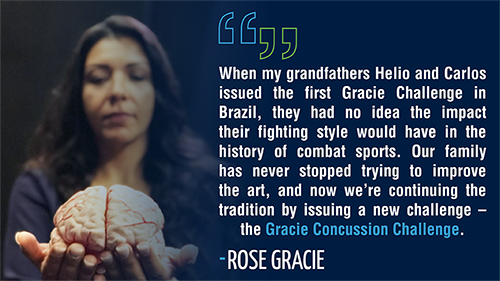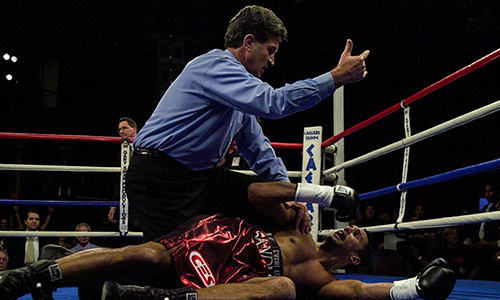Gracie Concussion Challenge
About the Gracie Concussion Challenge
Launched by Rose Gracie of the legendary Gracie Brazilian Jiu-Jitsu family, the Gracie Concussion Challenge calls on fighters to take control of their brain health by participating in research and getting educated on concussions and Chronic Traumatic Encephalopathy (CTE). CTE used to be called "punch-drunk" syndrome because it was first found in boxers, but is now found in combat sport athletes from various disciplines. So how can you complete the Gracie Concussion Challenge?
1) Pledge your brain to the Concussion Legacy Foundation.
YOU can be part of the solution when it comes to concussions and CTE in combat sports. The Concussion Legacy Foundation is proud to collaborate with the Boston University CTE Center and the Boston VA Healthcare System to form the preeminent repository for CTE research - the VA-BU-CLF Brain Bank. Thanks to the incredible researchers at Boston University and the VA, the Brain Bank is changing the world's understanding of brain injuries. More than 7,000 people, including Rose Gracie, MMA stars Paulo Filho and Renato "Babalu" Sobral, NASCAR legend Dale Earnhardt Jr., and soccer icon Brandi Chastain, have pledged their brain to contribute to this research and help others.

2) Get educated.
Get educated on concussions and CTE to protect your brain and your career. Read the sections below to learn how to recognize the signs and symptoms of a concussion, why you need rest after a concussion, and why you should avoid taking hits to the head during sparring:
Know the signs and symptoms of a concussion.
It's crucial to be able to recognize the signs and symptoms of a concussion, because a concussion doesn't show up on imaging like an x-ray, CTE, or MRI scan and there is no objective test, like a blood or saliva test, that can determine whether a patient has a concussion. A doctor is able to make a concussion diagnosis based on a comprehensive examination, which includes observing signs of concussion and patients reporting symptoms of concussion appearing after an impact to the head or body. Concussion signs and symptoms are the brain's way of showing it is injured and not functioning normally. Sometimes it can take hours or even a few days for concussion symptoms to appear after the initial injury.

Concussion signs
Concussion signs are what someone could observe about you to determine if you have a concussion. They range from obvious to much more nuanced, but even one sign of a concussion after a head impact should be reported to a medical professional.
Common concussion signs include:
- Loss of consciousness
- Problems with balance
- Glazed look in the eyes
- Amnesia
- Delayed response to questions
- Confusion
- Inappropriate crying
- Inappropriate laughter
- Vomiting
Concussion symptoms
Concussion symptoms are what someone who is concussed will tell you that they are experiencing. They typically fall into four major categories:
1- Somatic (Physical) Symptoms
- Headache
- Light-headedness
- Dizziness
- Nausea
- Sensitivity to light
- Sensitivity to noise
2- Cognitive Symptoms
- Difficulties with attention
- Memory problems
- Loss of focus
- Difficulty multitasking
- Difficulty completing mental tasks
3- Sleep Symptoms
- Sleeping more than usual
- Sleeping less than usual
- Having trouble falling asleep
4- Emotional Symptoms
- Anxiety
- Depression
- Panic attacks
Note: This is not an exhaustive list of concussion signs and symptoms.
Give yourself time to heal.
If you suspect a concussion in yourself or in another fighter, it is extremely important to discontinue training or competition immediately. If you try to "tough it out" through a concussion, you may cause your symptoms to last longer and put yourself at risk for Post-Concussion Syndrome (PCS) and Second Impact Syndrome.
After removal from training or competition, make sure to get evaluated by an appropriate medical professional. Then, the first step in your recovery plan should be to rest your body and brain, gradually increasing your activity level as tolerated. If an activity causes your symptoms to worsen, don't do it. Hear from Dr. Robert Cantu, medical director of the Concussion Legacy Foundation, about why the brain needs rest after it has been injured:
Avoid unnecessary hits to the head, especially in sparring.
Combat sport athletes need to understand that repeated concussive and subconcussive hits to the head over time may lead to Chronic Traumatic Encephalopathy (CTE). The best way for fighters to protect themselves from concussions and from CTE is to remove unnecessary hits from sparring. If you train without taking hits to the head, you should drastically reduce your risk for developing CTE later in life. Visit our Subconcussive Impacts page to learn more about why it's so important to avoid repetitive hits to the head.
We worked with TED Ed to create this educational video on concussions, Post-Concussion Syndrome (PCS), subconcussive impacts, and CTE: